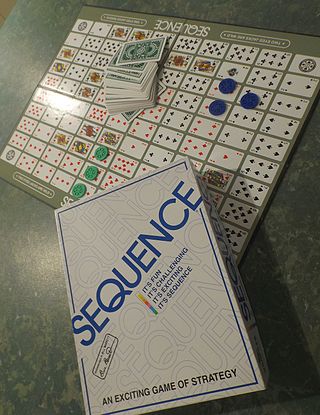Related Research Articles

Drinking games are games which involve the consumption of alcoholic beverages and often enduring the subsequent intoxication resulting from them. Evidence of the existence of drinking games dates back to antiquity. Drinking games have been banned at some institutions, particularly colleges and universities.

Games of patience, or (card) solitaires as they are usually called in North America, have their own 'language' of specialised terms such as "building down", "packing", "foundations", "talon" and "tableau". Once learnt they are helpful in describing, succinctly and accurately, how the games are played. Patience games are usually for a single player, although a small number have been designed for two and, in rare cases, three or even four players. They are games of skill or chance or a combination of the two. There are three classes of patience grouped by object.
Spit, also known as Slam or Speed, is a card game of the shedding family for two players. The game is played until all of a player's cards are gone.

Shithead is a card game, the object of which is to lose all of one's playing cards, with the final player being the "shithead". The game became popular among backpackers in the late 20th century. Although the basic structure of the game generally remains constant, there are regional variations to the game's original rules.

Uno is an American shedding-type card game that is played with a specially printed deck. The game's general principles put it into the crazy eights family of card games, and it is similar to the traditional European game mau-mau.

Concentration, also known as Memory, Shinkei-suijaku, Matching Pairs, Match Match, Match Up, Pelmanism, Pexeso or simply Pairs, is a card game in which all of the cards are laid face down on a surface and two cards are flipped face up over each turn. The object of the game is to turn over pairs of matching cards.

Cheat is a card game where the players aim to get rid of all of their cards. It is a game of deception, with cards being played face-down and players being permitted to lie about the cards they have played. A challenge is usually made by players calling out the name of the game, and the loser of a challenge has to pick up every card played so far. Cheat is classed as a party game. As with many card games, cheat has an oral tradition and so people are taught the game under different names.

Slapjack, also known as Slaps, is a card game of the matching family, generally played among children. It can often be a child's first introduction to playing cards. The game is a cross between Beggar-My-Neighbour and Egyptian Ratscrew and is also sometimes known as Heart Attack. It is also related to the simpler 'slap' card games often called Snap.
Spite and Malice, also known as Cat and Mouse or Screw Your Neighbor, is a traditional card game for two or more players. It is a reworking of the late 19th century Continental game Crapette and is a form of competitive solitaire, with a number of variations that can be played with two or three regular decks of cards. It is descended from Russian Bank.

Kings is a drinking game that uses playing cards. The player must drink and dispense drinks based on cards drawn. Each card has a rule that is predetermined before the game starts. Often groups establish house rules with their own variation of rules.
The game of Bartok, also known by a number of other names, such as Wartoke, Warthog, Bartog, Bentok, Last One Standing or Bong 98, is a card game popular in Australia where the winner of each round invents a new rule which must be obeyed for the remainder of the game. It belongs to the "shedding" or Eights family of card games, whereby each player tries to rid themselves of all of their cards. The game progresses through a series of rounds with a new rule being added in each round, thus making the game increasingly complex as it progresses. These newly introduced rules may modify any existing rules.

Golf is a card game where players try to earn the lowest number of points over the course of nine deals.

Pyramid is a patience or solitaire game of the Simple Addition family, where the object is to get all the cards from the pyramid to the foundation.

Sequence is an abstract strategy board-and-card game. Sequence was invented by Doug Reuter. He originally called the game Sequence Five. He spent years developing the concept, and, in June 1981, granted Jax Ltd. an exclusive license to manufacture, distribute and sell the board game Sequence and its subsequent variations. The game was first sold in a retail store in 1982. In 2017, Goliath Game Company bought Jax, and in early 2018 also bought all licensor rights and now owns 100% of the game Sequence. Doug Reuter is acknowledged as the inventor of Sequence on all newly produced copies of the game - both on the box and in the printed rules.
Speed is a game for two players or more of the shedding family of card games, in which players try to get rid of all of their cards first.

Pyramid is a drinking game played with a standard deck of playing cards.
Around the world is a card-based drinking game, similar to president, but more complex and at the same time quicker. The game requires one standard (52-card) deck of playing cards. More decks can be added to accommodate additional players and increase difficulty.
Last Card is a shedding-type card game popular in New Zealand and Australia. It is similar in most aspects to Uno, Mau Mau or Crazy Eights but several rules differentiate it, for instance the function of a particular card.

Jungle Speed is a card game created by Thomas Vuarchex and Pierric Yakovenko in 1991. First self-published and now published by Asmodee Editions, it is played with non-standard playing cards. An expansion and all-in set have been published.
Family Game Night was an American television game show based on Hasbro's family of board games and EA's video game franchise of the same name. The show was hosted by Todd Newton. Burton Richardson was the announcer for the first two seasons; he was replaced by Stacey J. Aswad in the third season, and Andrew Kishino was hired for the fourth season. The 60-minute program debuted on October 10, 2010, on The Hub which was Discovery Kids. The network became Discovery Family on October 13, 2014; it was previewed on October 9, 2010, on its sister channel, TLC. Seasons 1 and 2 each contained 26(1) and 30(2) episodes. Seasons 3, 4 and 5 each contained 15 episodes. Season 2 premiered on Friday, September 2, 2011, with additional games being added. The games added to the second season included Cranium Brain Breaks, Green Scream, Ratuki Go-Round, Simon Flash, Operation Sam Dunk, Trouble Pop Quiz, and Spelling Bee. However games from the previous season were still kept.
References
- ↑ My Drinking Games Rings Of Fire Rules Archived 2011-01-01 at the Wayback Machine
- ↑ EatTheWorm.com - Drinking Games - Pyramid
- ↑ Amy Sommer. Campus Circle Newspaper "Party Drinking Games" February 25, 2009.